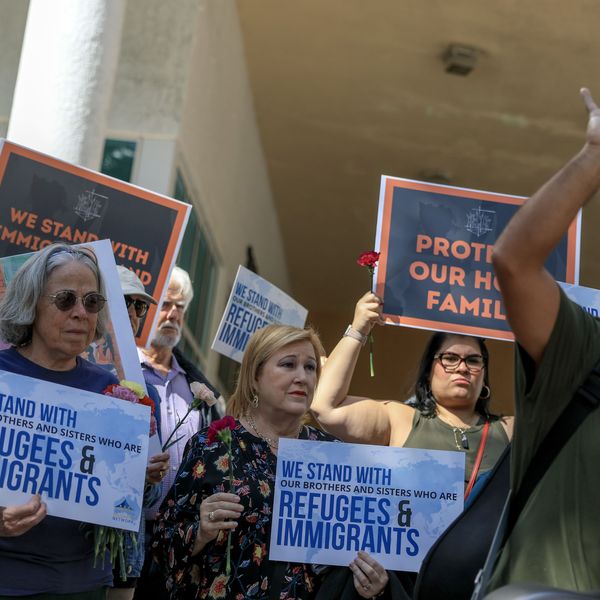
Asylum-seekers prepare to be taken to a U.S. Border Patrol processing facility after crossing into the U.S. on June 16, 2021, in La Joya, Texas.
Critics Compare Biden's Proposed Asylum Rule to 'Failed Trump-Era Policies'
"The Biden administration and Congress must not erect any more unjust barriers to asylum that will sow further disorder and result in irreparable harm," said one migrant rights advocate.
Immigrant rights advocates on Thursday slammed the Biden administration's proposal to fast-track the rejection of certain migrants seeking asylum in the United States.
On Thursday the U.S. Department of Homeland Security (DHS) proposed a rule that would empower immigration officials to disqualify certain asylum-seekers during their initial eligibility screening—called the credible fear interview (CFI)—using existing national security and terrorism-related criteria, or bars.
DHS said the rule would apply to noncitizens who have "engaged in certain criminal activity, persecuted others, or have been involved in terrorist activities."
"I urge President Biden to embrace our values as a nation of immigrants and use this opportunity to instead provide relief for the long-term immigrants of this nation."
Homeland Security Secretary Alejandro Mayorkas called the proposed rule "yet another step in our ongoing efforts to ensure the safety of the American public by more quickly identifying and removing those individuals who present a security risk and have no legal basis to remain here."
However, Greg Chen, senior director of government relations for the American Immigration Lawyers Association, argued that while "bars are an important feature of our immigration laws to ensure that dangerous individuals are not allowed into the country," they must be "accurately applied where warranted."
"This change could make the process faster by excluding people who would not be entitled to stay," he noted. "However, due process will likely be eroded by accelerating what is a highly complex legal analysis needed for these bars and conducting them at the preliminary CFI screening."
As Chen explained:
At that early stage, few asylum seekers will have the opportunity to seek legal counsel or time to understand the consequences of a bar being applied. Under the current process, they have more time to seek legal advice, to prepare their case, and to appeal it or seek an exemption. Ultimately to establish a fair and orderly process at the border, Congress needs to provide the Department of Homeland Security with the resources to meet its mission and also ensure the truly vulnerable are not summarily denied protection without due process.
Democratic lawmakers—some of whom held a press conference Wednesday on protecting undocumented immigrants in the U.S.—also criticized the proposal.
"As the Biden administration considers executive actions on immigration, we must not return to failed Trump-era policies aimed at banning asylum and moving us backwards," said Sen. Alex Padilla (D-Calif.), referring to former Republican President Donald Trump, the presumptive 2024 GOP nominee to face President Joe Biden in November.
"I urge President Biden to embrace our values as a nation of immigrants and use this opportunity to instead provide relief for the long-term immigrants of this nation," he added.
One year ago, critics accused Biden of "finishing Trump's job" by implementing a crackdown on asylum-seekers upon the expiration of Title 42—a provision first invoked during Trump administration at the onset of the Covid-19 pandemic and continued by Biden to expel more than 1 million migrants under the pretext of public safety.
Earlier this week, the advocacy group Human Rights First released a report detailing the harms of the policy on its anniversary. The group held a press conference to unveil the report and warn of the dangers of further anti-migrant policies.
"The interviews with hundreds of asylum-seekers make clear that the asylum ban and related restrictions strands in danger children and adults seeking asylum, punishes people for seeking protection, leads to the return of refugees to persecution, spurs irregular crossings, and denies equal access to asylum to people facing the most dire risks," Human Rights First director of research and analysis of refugee protection Christina Asencio said during the press conference.
"The Biden administration and Congress must not erect any more unjust barriers to asylum that will sow further disorder and result in irreparable harm," Asencio added.
On Wednesday, three advocacy groups—Al Otro Lado, the Civil Rights Education and Enforcement Center, and the Texas Civil Rights Project—sued the federal government on behalf of noncitizens with disabilities seeking more information regarding CBP One, the problem-plagued Customs and Border Protection app migrants must use to schedule asylum interviews at U.S. ports of entry.
"We have and continue to see migrants with disabilities facing unlawful discrimination and unequal access to the asylum process due to the inaccessibility of the app," said Laura Murchie, an attorney with the Civil Rights and Education Enforcement Center involved in the case.
"CBP needs to release these documents so we can advocate for and ensure compliance with the law so asylum-seekers with disabilities do not continue to be harmed by CBP's disregard for rights that are guaranteed by federal disability law," she added.
An Urgent Message From Our Co-Founder
Dear Common Dreams reader, The U.S. is on a fast track to authoritarianism like nothing I've ever seen. Meanwhile, corporate news outlets are utterly capitulating to Trump, twisting their coverage to avoid drawing his ire while lining up to stuff cash in his pockets. That's why I believe that Common Dreams is doing the best and most consequential reporting that we've ever done. Our small but mighty team is a progressive reporting powerhouse, covering the news every day that the corporate media never will. Our mission has always been simple: To inform. To inspire. And to ignite change for the common good. Now here's the key piece that I want all our readers to understand: None of this would be possible without your financial support. That's not just some fundraising cliche. It's the absolute and literal truth. We don't accept corporate advertising and never will. We don't have a paywall because we don't think people should be blocked from critical news based on their ability to pay. Everything we do is funded by the donations of readers like you. Will you donate now to help power the nonprofit, independent reporting of Common Dreams? Thank you for being a vital member of our community. Together, we can keep independent journalism alive when it’s needed most. - Craig Brown, Co-founder |
Immigrant rights advocates on Thursday slammed the Biden administration's proposal to fast-track the rejection of certain migrants seeking asylum in the United States.
On Thursday the U.S. Department of Homeland Security (DHS) proposed a rule that would empower immigration officials to disqualify certain asylum-seekers during their initial eligibility screening—called the credible fear interview (CFI)—using existing national security and terrorism-related criteria, or bars.
DHS said the rule would apply to noncitizens who have "engaged in certain criminal activity, persecuted others, or have been involved in terrorist activities."
"I urge President Biden to embrace our values as a nation of immigrants and use this opportunity to instead provide relief for the long-term immigrants of this nation."
Homeland Security Secretary Alejandro Mayorkas called the proposed rule "yet another step in our ongoing efforts to ensure the safety of the American public by more quickly identifying and removing those individuals who present a security risk and have no legal basis to remain here."
However, Greg Chen, senior director of government relations for the American Immigration Lawyers Association, argued that while "bars are an important feature of our immigration laws to ensure that dangerous individuals are not allowed into the country," they must be "accurately applied where warranted."
"This change could make the process faster by excluding people who would not be entitled to stay," he noted. "However, due process will likely be eroded by accelerating what is a highly complex legal analysis needed for these bars and conducting them at the preliminary CFI screening."
As Chen explained:
At that early stage, few asylum seekers will have the opportunity to seek legal counsel or time to understand the consequences of a bar being applied. Under the current process, they have more time to seek legal advice, to prepare their case, and to appeal it or seek an exemption. Ultimately to establish a fair and orderly process at the border, Congress needs to provide the Department of Homeland Security with the resources to meet its mission and also ensure the truly vulnerable are not summarily denied protection without due process.
Democratic lawmakers—some of whom held a press conference Wednesday on protecting undocumented immigrants in the U.S.—also criticized the proposal.
"As the Biden administration considers executive actions on immigration, we must not return to failed Trump-era policies aimed at banning asylum and moving us backwards," said Sen. Alex Padilla (D-Calif.), referring to former Republican President Donald Trump, the presumptive 2024 GOP nominee to face President Joe Biden in November.
"I urge President Biden to embrace our values as a nation of immigrants and use this opportunity to instead provide relief for the long-term immigrants of this nation," he added.
One year ago, critics accused Biden of "finishing Trump's job" by implementing a crackdown on asylum-seekers upon the expiration of Title 42—a provision first invoked during Trump administration at the onset of the Covid-19 pandemic and continued by Biden to expel more than 1 million migrants under the pretext of public safety.
Earlier this week, the advocacy group Human Rights First released a report detailing the harms of the policy on its anniversary. The group held a press conference to unveil the report and warn of the dangers of further anti-migrant policies.
"The interviews with hundreds of asylum-seekers make clear that the asylum ban and related restrictions strands in danger children and adults seeking asylum, punishes people for seeking protection, leads to the return of refugees to persecution, spurs irregular crossings, and denies equal access to asylum to people facing the most dire risks," Human Rights First director of research and analysis of refugee protection Christina Asencio said during the press conference.
"The Biden administration and Congress must not erect any more unjust barriers to asylum that will sow further disorder and result in irreparable harm," Asencio added.
On Wednesday, three advocacy groups—Al Otro Lado, the Civil Rights Education and Enforcement Center, and the Texas Civil Rights Project—sued the federal government on behalf of noncitizens with disabilities seeking more information regarding CBP One, the problem-plagued Customs and Border Protection app migrants must use to schedule asylum interviews at U.S. ports of entry.
"We have and continue to see migrants with disabilities facing unlawful discrimination and unequal access to the asylum process due to the inaccessibility of the app," said Laura Murchie, an attorney with the Civil Rights and Education Enforcement Center involved in the case.
"CBP needs to release these documents so we can advocate for and ensure compliance with the law so asylum-seekers with disabilities do not continue to be harmed by CBP's disregard for rights that are guaranteed by federal disability law," she added.
- Biden's Expansion of Title 42 Violates International Law: UN ›
- In Victory for Migrant Rights, US Court Blocks 'Cruel' Biden Asylum Restrictions ›
- Critics Warn Biden Is 'Finishing Trump's Job' With New Attack on Asylum-Seekers ›
- UN Refugee Agency Says Biden Asylum Plan 'Incompatible' With International Law ›
- 'More of This, Please': Advocates Outraged by Biden Asylum Ban Praise New Actions | Common Dreams ›
- 'It's a Disgrace': Biden Weighs Making Temporary Asylum Limits Harder to Lift | Common Dreams ›
Immigrant rights advocates on Thursday slammed the Biden administration's proposal to fast-track the rejection of certain migrants seeking asylum in the United States.
On Thursday the U.S. Department of Homeland Security (DHS) proposed a rule that would empower immigration officials to disqualify certain asylum-seekers during their initial eligibility screening—called the credible fear interview (CFI)—using existing national security and terrorism-related criteria, or bars.
DHS said the rule would apply to noncitizens who have "engaged in certain criminal activity, persecuted others, or have been involved in terrorist activities."
"I urge President Biden to embrace our values as a nation of immigrants and use this opportunity to instead provide relief for the long-term immigrants of this nation."
Homeland Security Secretary Alejandro Mayorkas called the proposed rule "yet another step in our ongoing efforts to ensure the safety of the American public by more quickly identifying and removing those individuals who present a security risk and have no legal basis to remain here."
However, Greg Chen, senior director of government relations for the American Immigration Lawyers Association, argued that while "bars are an important feature of our immigration laws to ensure that dangerous individuals are not allowed into the country," they must be "accurately applied where warranted."
"This change could make the process faster by excluding people who would not be entitled to stay," he noted. "However, due process will likely be eroded by accelerating what is a highly complex legal analysis needed for these bars and conducting them at the preliminary CFI screening."
As Chen explained:
At that early stage, few asylum seekers will have the opportunity to seek legal counsel or time to understand the consequences of a bar being applied. Under the current process, they have more time to seek legal advice, to prepare their case, and to appeal it or seek an exemption. Ultimately to establish a fair and orderly process at the border, Congress needs to provide the Department of Homeland Security with the resources to meet its mission and also ensure the truly vulnerable are not summarily denied protection without due process.
Democratic lawmakers—some of whom held a press conference Wednesday on protecting undocumented immigrants in the U.S.—also criticized the proposal.
"As the Biden administration considers executive actions on immigration, we must not return to failed Trump-era policies aimed at banning asylum and moving us backwards," said Sen. Alex Padilla (D-Calif.), referring to former Republican President Donald Trump, the presumptive 2024 GOP nominee to face President Joe Biden in November.
"I urge President Biden to embrace our values as a nation of immigrants and use this opportunity to instead provide relief for the long-term immigrants of this nation," he added.
One year ago, critics accused Biden of "finishing Trump's job" by implementing a crackdown on asylum-seekers upon the expiration of Title 42—a provision first invoked during Trump administration at the onset of the Covid-19 pandemic and continued by Biden to expel more than 1 million migrants under the pretext of public safety.
Earlier this week, the advocacy group Human Rights First released a report detailing the harms of the policy on its anniversary. The group held a press conference to unveil the report and warn of the dangers of further anti-migrant policies.
"The interviews with hundreds of asylum-seekers make clear that the asylum ban and related restrictions strands in danger children and adults seeking asylum, punishes people for seeking protection, leads to the return of refugees to persecution, spurs irregular crossings, and denies equal access to asylum to people facing the most dire risks," Human Rights First director of research and analysis of refugee protection Christina Asencio said during the press conference.
"The Biden administration and Congress must not erect any more unjust barriers to asylum that will sow further disorder and result in irreparable harm," Asencio added.
On Wednesday, three advocacy groups—Al Otro Lado, the Civil Rights Education and Enforcement Center, and the Texas Civil Rights Project—sued the federal government on behalf of noncitizens with disabilities seeking more information regarding CBP One, the problem-plagued Customs and Border Protection app migrants must use to schedule asylum interviews at U.S. ports of entry.
"We have and continue to see migrants with disabilities facing unlawful discrimination and unequal access to the asylum process due to the inaccessibility of the app," said Laura Murchie, an attorney with the Civil Rights and Education Enforcement Center involved in the case.
"CBP needs to release these documents so we can advocate for and ensure compliance with the law so asylum-seekers with disabilities do not continue to be harmed by CBP's disregard for rights that are guaranteed by federal disability law," she added.
- Biden's Expansion of Title 42 Violates International Law: UN ›
- In Victory for Migrant Rights, US Court Blocks 'Cruel' Biden Asylum Restrictions ›
- Critics Warn Biden Is 'Finishing Trump's Job' With New Attack on Asylum-Seekers ›
- UN Refugee Agency Says Biden Asylum Plan 'Incompatible' With International Law ›
- 'More of This, Please': Advocates Outraged by Biden Asylum Ban Praise New Actions | Common Dreams ›
- 'It's a Disgrace': Biden Weighs Making Temporary Asylum Limits Harder to Lift | Common Dreams ›

